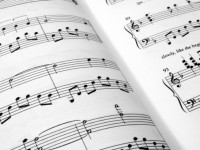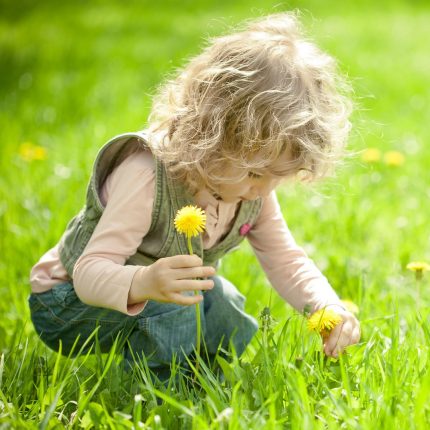Many scholars, teachers and musicians have argued over this simple question: “Is music a language?” It’s true that reading music notation can be compared to reading text. Many of us have similar emotional reactions to particular types of music, that’s why movie soundtracks are so effective.
A recent study conducted at John Hopkins determined that speaking and playing music (specifically jazz improvisations) activated some of the same sections of the brain. The main difference is an important one. When the musicians played, the area of the brain that is typically associated with meaning did not activate. So, music can be used to communicate broad emotions and ideas, but the specifics are lost in the absence of text.
Music isn’t exactly a language, but it is very language-like. What does that mean for our children? How do we approach learning and comprehension in music?
Start with Music Education Early
When you learned your native language, how did you do it? It’s hard to remember because we started learning as soon as we took that first breath. We begin by listening to the sounds around us. Then we experiment with our own voice making babbling sounds. Eventually we are able to say simple words and we understand their meaning.
Luckily, music is all around us. It’s on the radio in the car, the overhead speakers at the mall and grocery stores and it accompanies commercials and shows on TV. Inherently, children are exposed to music early on.
Learning multiple languages comes easier at a young age, and the same is true for learning music. So, start early and expose your child to a myriad of musical styles.
What can you do to develop the music within your child?
Babies
-Listen to many styles of music from classical to hip hop
-Dance while holding baby and rock rhythmically
-Sing to your baby (even if you think you can’t)
Toddlers
-Clap to the beat
-Sing simple songs together
-Explore fast and slow speeds
-Identify high and low sounds
-Point out loud and soft sounds
Preschoolers
-Enroll in a group music class
-Allow play on age-appropriate instruments i.e. maracas, hand drums, xylophone
-Make up stories while listening to instrumental music
Gradeschoolers
-Begin private music lessons
-Incorporate structured practice time
-Encourage improvisation and creativity
Teenagers
-Jam together as a family
-Attend concerts together and discuss them afterward (over ice cream or pizza!)
-Encourage self-expression through writing music
Practice makes perfect
As a parent or a teacher, you understand that it takes a few times (or a few hundred) in order for a child to master a new skill. Regardless of whether we are teaching them to say their ABC’s, tie their shoes, or play “Mary Had a Little Lamb” on the piano, kids learn best if things are broken down into bite-sized pieces.
Sometimes practice time becomes a battle and usually it’s because we forget to teach our kids and students how to practice. Good practice habits start at a young age and will often lead to good habits with homework and chores. They teach us that even if something doesn’t come to us instantly, it’s worth trying, and if you work at it, you just might surprise yourself!
Goals and ideas for effective practicing
-Daily practice (or at least every other day)
-Set reasonable time expectations based on the student’s age and attention span
-Play the hard part first
-Take it at a slower tempo (speed) to allow your brain more time to think
-Tap out the rhythm
-If you’re an instrumentalist, sing the melody before trying to play it
-If you’re a vocalist, sing the melody on a comfortable vowel before adding the text or speak the text before trying to sing it.
-Ask your teacher for more ideas, the list is truly endless!
It’s not what you say…
We’ve all heard this modern proverb, “It’s not what you say, but how you say it.” Once again, this does not merely apply to the way we communicate verbally through various languages. It is directly applicable to music as well. Any great musician will agree that there is a huge difference between playing technically and expressively. Both skills are very important and must be developed.
Often we see students who are being pushed very hard. We want them to play faster scales, more complicated etudes and larger works far beyond their level because our society has become obsessed with quantifiable goals. It doesn’t take long and the student becomes frustrated, disinterested and unsure of their abilities. Obviously, it is important to challenge children but, it must be done in a measured and conservative manner consistent with the student’s current abilities and their desire to advance.
How then do we teach expressiveness? This can be a real challenge because in order to play expressively, one must have a certain level of technical skill. So, we must allow our students to play pieces that they can technically master. If they are struggling with fingerings, rhythms, articulations or even simple note-reading, they will struggle to play with any emotion, except perhaps anger and frustration! For most students, playing a piece they have mastered both technically and expressively brings the most enjoyment.
Find their favorite Music
To bring it full circle, do you recall having a favorite book when you were a young child? One that you would choose as a bedtime story almost every night? Did you have that book memorized to the point that you didn’t even need to look at the text on the page? Did you love to have the story read to you using all the voices? I bet your child does (or did) the same thing too. As musicians, we have that favorite piece. That song that we couldn’t forget if we tried. That piece that touches our soul to the core and the only way to explain it, is to perform it.
Visit Forbes Music Company at www.forbesmusic.com/blog for more insights!
More resources for homeschool music!
Hand Exercises for Children Learning Music






